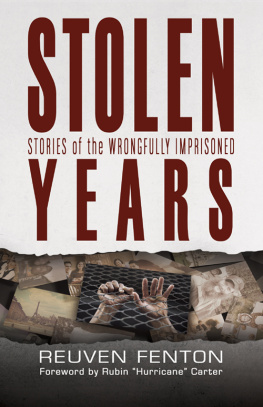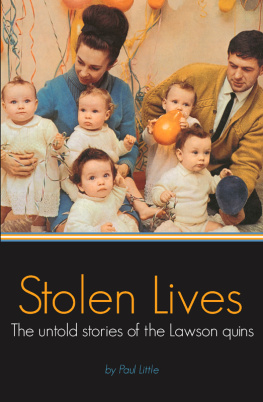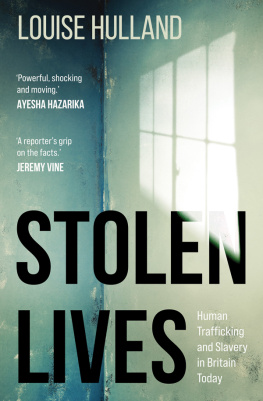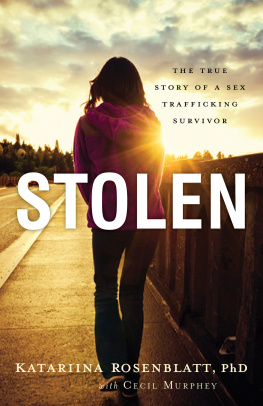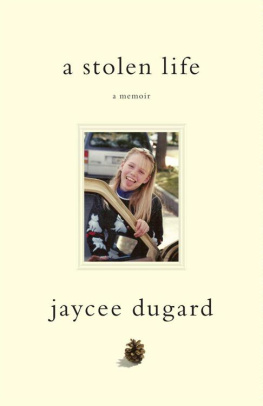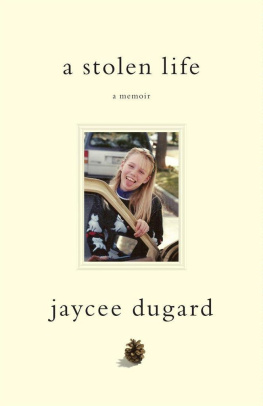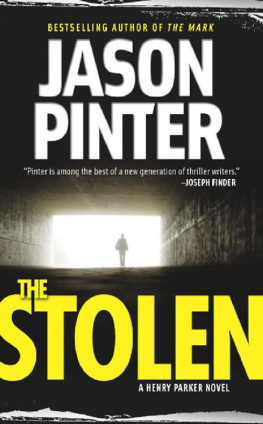Table of Contents
Pagebreaks of the print version
Guide
STOLEN YEARS

To Marty and Daniel
Tantor Media, Inc.
A Division of Recorded Books
6 Business Park Road
Old Saybrook, CT 06475
tantor.com
tantorpublishing.com
Stolen Years: Stories of the Wrongfully Imprisoned
Copyright 2015 by Reuven Fenton
Author photo Paul Martinka
Select cover photos provided courtesy of Muhammad Don Ray Adams,
Debra Brown, Cornelius Dupree, and Thomas Kennedy.
Design and Illustrations by Elizabeth Gibbings.
All rights reserved. No part of this book may be used or reproduced in any manner without written permission except in the case of brief quotations for reviews or critical articles.
ISBN: 9781618031082
Printed in the United States of America
First Tantor Media Printing, November 10, 2015
FOREWORD
March 2014
When, at the age of twenty-nine, I was wrongly convicted of a triple murder in Paterson, New Jersey, I just narrowly escaped the electric chair. I was given life in prison instead.
Because I might have been executed for something I didnt do, I have staunchly opposed capital punishment to this day. Who knows how many people have been executed for crimes they did not commit? In an imperfect system run by human beings (and what system isnt?) errors are inevitable. Capital punishment is a perfect punishmentan eye for an eyebut you cannot have a perfect punishment in an imperfect system.
Nothing illustrates the imperfection of the system more than wrongful convictions. They are the absolute bane of the justice system.
In this gripping book, Reuven Fenton shows us the devastating consequences that arise when one is convicted for a crime he or she did not commit.
These stories have happy endings. Sadly, most do not.
The causes of miscarriages of justice crop up again and again. A case is not safe in the presence of overworked and poorly prepared defense attorneys; false science; the youth of a defendant and his or her criminal history; racial prejudice; unreliable eyewitnesses; and, especially, the absence of hard evidence proving the defendant is innocent.
Many of these cases become constructs of the prosecutorsdamning stories that may persuade a jury to convict while the defense attorney is asleep at the wheel. And this is where the real problem lies. Every officer of the court is ethically bound to the truth, but not every officer of the court can resist the urge to further his or her career with a string of convictions, whether or not these convictions comply with the truth. It is precisely when winning or losing becomes the be-all and end-all that truth is disregarded and justice becomes elusive.
I disagree with those who say tunnel vision by prosecutors causes wrongful convictions. Tunnel vision sounds like a disease or condition that prosecutors suffer from and cannot control. The only one suffering is the convicted person.
My view is that the real cause of wrongful convictions is willful blindness. And thats something most defendants never imagine is possible. People like Cornelius Dupree naively believed the truth would set you free. Truth, my friend, wouldnt be recognized if she sashayed into the courtroom and sat smack-dab in the judges lap.
Once the defendant is found guilty, the real problems start. He or she is now buried under a deep, deep pile of procedural shit. That shit is there to protect the conviction and the people who perpetrated it. It sometimes takes decades to dig oneself out, but not without DNA evidence or another murderer or rapist admitting to the crime. A body for a body, as district attorneys like to say. Even then, its no slam dunk.
So the ambitions and reputations of the legal officers play a huge role in the failings of the system. Thats why we hear about Brady violationsinstances in which prosecutors deliberately hide evidence favorable to a defendant. And the prosecutors often do it post-conviction. Why would they do such a thing if not to protect the reputations of the people who conspired in the original conviction?
I see a world where reputations are enhanced by admitting to error and by working for the truth. The system would not be perfect but it would sure be a whole lot better.
What, then, do men and women do when they are sent to prison for something they have not done? To every human being in prison, guilty or innocent, I would say that it all depends upon attitude. The physical body is the vehicle in which we traverse life, but our attitude is our steering wheel.
In prison, people find themselves at the bottom of human existence. What a prisoner must say is, OK, whatever Ive done in life has led me to where I am today. Therefore, if I want to get out of prison and stay out, Ive got to turn around and go back the other way.
Prisoners must use this time to learn how to read if they dont know how, to learn to write, to learn a skill if they never had one. Maybe on the outside they didnt have time for any of these things. Now they do. This time has been imposed upon them. They must use it to look at themselves, to make themselves indispensable, to awaken.
I see myself in some of the former inmates profiled in the pages of this booklike Devon Ayers of the Bronx, who wrongfully went to prison for murder. Prison changed me into a better person, he says, and I know what he means. Although it wasnt the foul prison that did it; it was Devon.
That being said, self-improvement is the prisoners responsibility; the prisoners responsibility has nothing to do with the awesome responsibility of those who run the system. What is their responsibility? To just aim for the truth; not a conviction, not a verdict, not a win, nor a loss. Just the truth.
If the conviction was found to be wrong, they must recognize it and admit it. They must not fool themselves into believing that protecting a wrongful conviction serves justice, truth, or anything but themselves. If they reduce the barriers to the truth, they will relieve terrible human suffering, individual by individual. Thats a good thing. Take it from me, prison is suffering, and prison without justice is crucifixion.
To live in a world where truth matters and justicehowever latereally happens would be heaven right here on earth. Heaven on earth.
Dr. Rubin Hurricane Carter
May 6, 1937April 20, 2014
PREFACE
Go to the precinct.
Those are all the instructions a reporter at a New York City tabloid needs to hear from an editor to know that he or she has been assigned a perp walk.
A perp walk is when cops walk the accused out of the station house in cuffs and put him in a squad car to take him to court. Its a quick and chaotic mess. Photographers try not to trip over each other as they attempt to get a decent shot, while the reporters shout questions at the perp from the outer edges of the scrum.
Ive been assigned perp walks for as long as Ive been a reporter for the greatest tabloid in the world, the New York Post.
The walks are almost always preceded by hours of waiting, as detectives work the perp over and over in an interrogation room. If its a particularly high-profile casesomeone collared for pushing some poor guy onto the subway tracks right before the E train barreled past, for instancethen a lot of other reporters and camera people wait with you.
Empty coffee cups pile up at our feet. The wind shifts. Precinct detectives start giving us little nods when they come outside for smoke breaks. Representatives from the NYPDs public information office show up.

